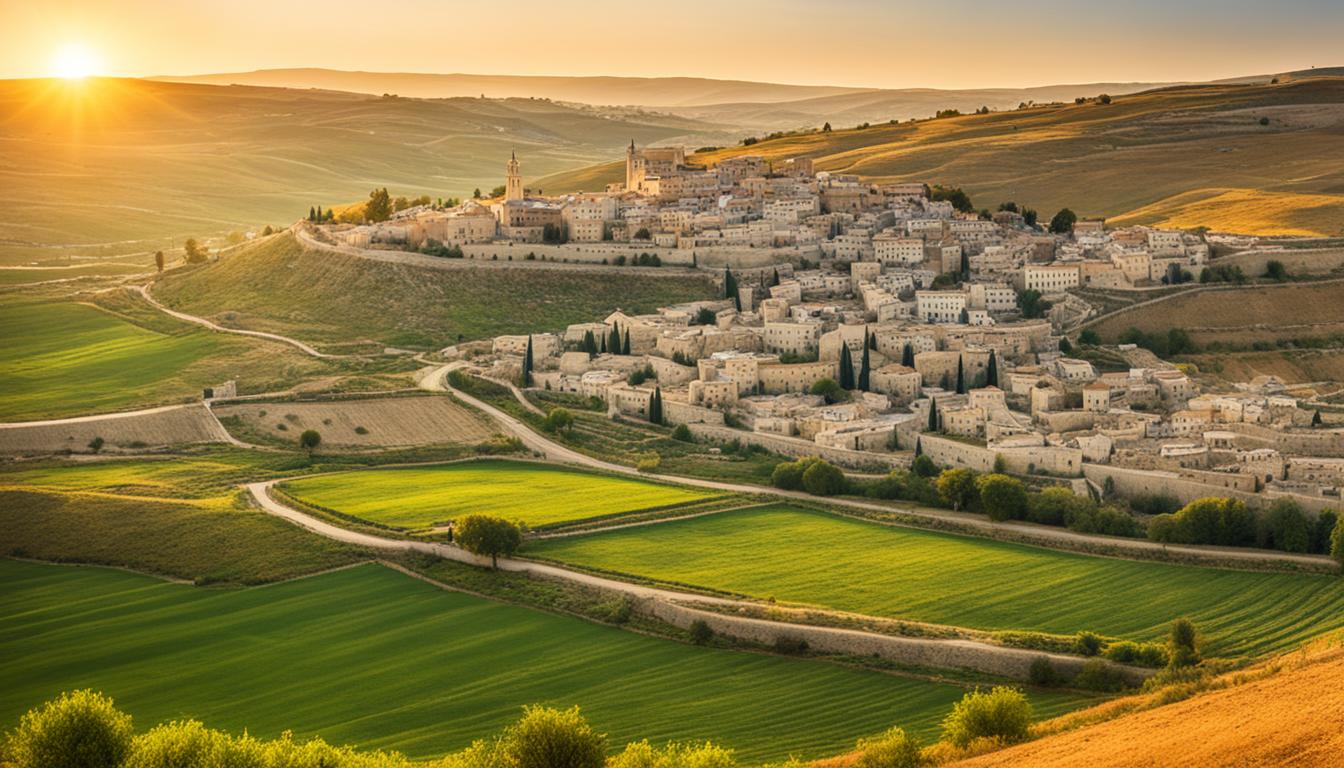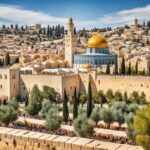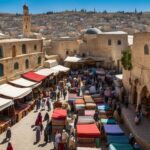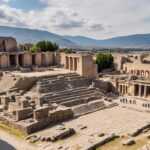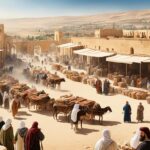Welcome to an in-depth exploration of Bethlehem in the Bible. This ancient city holds immense biblical significance and theological importance. It not only serves as the birthplace of Jesus but is also connected to various key events and themes in Scripture. Let’s delve into the rich history, geography, and spiritual significance of Bethlehem.
Key Takeaways:
- Bethlehem is the birthplace of Jesus, fulfilling biblical prophecies.
- It is associated with themes of sacrifice, redemption, and kingship.
- Bethlehem’s history dates back to the times of Rachel and King David.
- Archaeological discoveries validate Bethlehem’s existence in ancient times.
- The city’s cultural practices blend Muslim and Christian traditions.
Historical Significance of Bethlehem.
Bethlehem holds a significant place in biblical history and plays a crucial role in the narrative of the Bible. This ancient city is deeply intertwined with the lives of several key figures and events from the Old and New Testaments, highlighting its historical significance.
Birthplace of King David
One of the notable historical connections to Bethlehem is its association with King David, who was born and raised in this city. David, the beloved biblical figure and the second king of Israel, is often referred to as “David, the son of Jesse, from Bethlehem” (1 Samuel 17:58). His anointing as king by the prophet Samuel also took place in Bethlehem (1 Samuel 16:1-13). The significance of David’s link to Bethlehem is further emphasized by the recognition of Jesus as the Messiah, referred to as the “Son of David,” establishing a genealogical connection to Bethlehem (Matthew 1:1-17; Luke 2:4).
Burial Site of Rachel
In the book of Genesis, Bethlehem is mentioned as the burial site of Rachel, the wife of Jacob and the mother of Joseph and Benjamin. Rachel’s tomb is revered by both Jews and Christians and serves as a symbol of the historical and spiritual legacy associated with Bethlehem (Genesis 35:19-20).
“Thus says the Lord: A voice is heard in Ramah, lamentation and bitter weeping. Rachel is weeping for her children; she refuses to be comforted for her children because they are no more.” – Jeremiah 31:15
The biblical mention of Rachel weeping for her children signifies the deep emotional connection between Bethlehem and the sorrowful events surrounding the birth of Jesus, known as the Massacre of the Innocents (Matthew 2:16-18).
The historical significance of Bethlehem in biblical history is rooted in the connections it shares with prominent figures like King David and Rachel. These associations underscore the importance of Bethlehem within the larger narrative of the Bible.
Geographical Location of Bethlehem.
Bethlehem, known for its biblical significance, is located approximately six miles south of Jerusalem in the modern-day West Bank region. Situated in the hills of Judah, this ancient city holds a prominent place in religious history.
With its proximity to Jerusalem, Bethlehem is easily visible from the Mount of Olives, further cementing its connection to biblical narratives. Its location near Jerusalem has shaped its significance in both biblical and religious contexts.
The table below provides an overview of Bethlehem’s geographical location:
| Location | Coordinates |
|---|---|
| Bethlehem | 31°42′24″N 35°12′0″E |
| Jerusalem | 31°46′43″N 35°13′49″E |
As seen above, Bethlehem is situated at approximately 31°42′24″N latitude and 35°12′0″E longitude, while Jerusalem lies at around 31°46′43″N latitude and 35°13′49″E longitude.
Image:
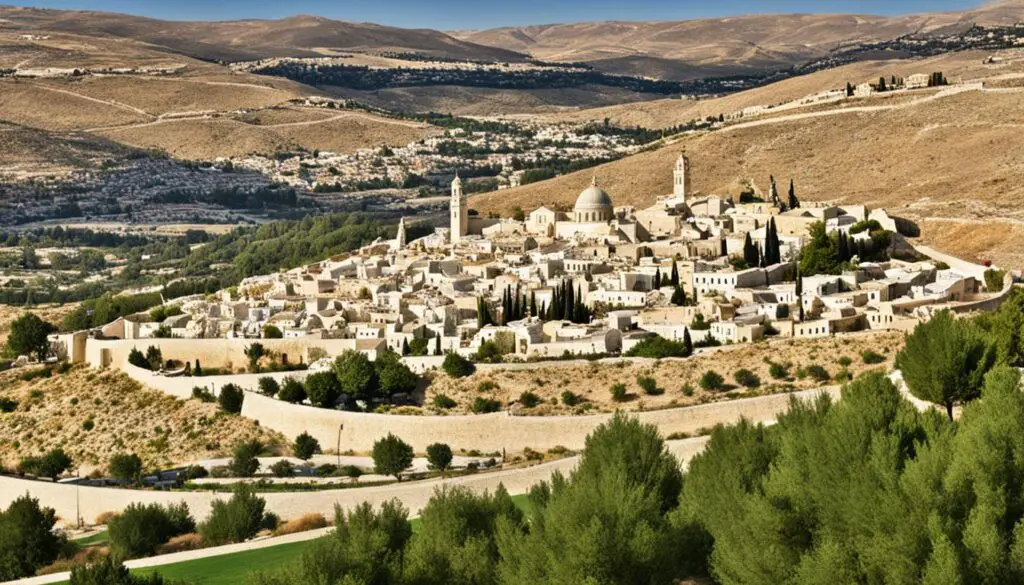
With its location near Jerusalem and its rich biblical history, Bethlehem continues to captivate the hearts and minds of travelers and pilgrims from around the world.
Archaeological Discoveries in Bethlehem.
Excavations in Bethlehem, particularly in the City of David, have uncovered fascinating archaeological findings that provide tangible evidence of the city’s historical existence. These discoveries shed light on the rich history of Bethlehem mentioned in the Bible.
One notable finding is a clay seal, discovered in the City of David, bearing the inscription “From the town of Bethlehem to the King.” This seal dates back to the 8th or 7th century BCE, emphasizing the ancient roots of Bethlehem and its prominence during that time period.
These archaeological excavations not only validate the biblical references to Bethlehem but also offer insight into the daily lives and activities of the people who lived there long ago. The artifacts unearthed in Bethlehem serve as a testament to the city’s significance in biblical and historical contexts.
The discoveries in Bethlehem’s City of David provide a valuable window into the past and contribute to our understanding of the region’s ancient civilizations. They allow us to connect with the stories and events that took place in this ancient city, enriching our knowledge of Bethlehem’s historical and cultural heritage.
Theological Themes Associated with Bethlehem.
Bethlehem, as depicted in the Bible, is intertwined with various theological themes that hold significant spiritual significance. This ancient city serves as the birthplace of Jesus, fulfilling long-standing prophecies regarding the Messiah’s origin.
One of the prominent theological themes associated with Bethlehem is that of sacrifice. The birth of Jesus in a humble manger reflects God’s sacrificial love for humanity, symbolizing his willingness to give up his own glory to bring salvation. This profound act of sacrifice resonates throughout the biblical narrative, illustrating the immense value and importance of Bethlehem’s role in God’s redemptive plan.
“For God so loved the world, that he gave his only Son, that whoever believes in him should not perish but have eternal life.” – John 3:16
Redemption is another theological theme deeply connected to Bethlehem. Through the birth of Jesus, Bethlehem becomes the birthplace of hope and redemption for all mankind. This divine act of redemption paved the way for forgiveness, restoration, and reconciliation between God and humanity, emphasizing the transformative power of God’s love and grace.
The biblical accounts mention Bethlehem as the birthplace of the Shepherd-King, an essential theme that highlights Jesus’ role as the Good Shepherd who guides and protects his flock. This imagery of the Shepherd-King evokes a sense of comfort and security, illustrating Jesus’ divine authority and his profound care for his people.
Furthermore, Bethlehem is intimately connected to the theme of kingship. The Old Testament prophecies foretold that a great ruler would originate from Bethlehem, establishing an everlasting kingdom. Jesus’ birth in Bethlehem signifies the fulfillment of these prophecies as he is revealed as the long-awaited King who reigns with righteousness and justice.
The biblical themes of sacrifice, redemption, the Shepherd-King, and kingship intricately interweave with Bethlehem’s theological significance. This historic city becomes the embodiment of divine promises, revealing God’s faithfulness and love towards humanity.
Key Biblical Events in Bethlehem.
Bethlehem, a city of profound biblical significance, serves as the backdrop for several key events in the life of Jesus and the biblical narrative. These events hold great significance for believers and are celebrated as crucial moments in the history of Christianity.
First and foremost is the birth of Jesus in Bethlehem’s humble manger. This miraculous event, celebrated during Christmas, marks the arrival of the long-awaited Messiah and showcases the love and salvation offered to humanity through Jesus’ birth.
In addition to Jesus’ birth, Bethlehem is also notable for its connection to the story of Ruth and Boaz. Ruth, a Moabite woman, found refuge and redemption in Bethlehem after experiencing great loss. Her love story with Boaz serves as a beautiful example of how God can restore hope and bring blessings even in the most challenging times.
The Journey of the Magi
“And behold, the star that they had seen when it rose went before them until it came to rest over the place where the child was. When they saw the star, they rejoiced exceedingly with great joy.” – Matthew 2:9-10
Another significant moment tied to Bethlehem is the journey of the Magi. Guided by a star, these wise men traveled from the east to pay homage to the newborn king. Their visit symbolizes the recognition of Jesus’ divinity and the offering of precious gifts as an act of worship.
These events in Bethlehem’s history play a pivotal role in the life of Jesus and affirm its significance as a sacred location associated with the fulfillment of prophecies and the birth of Christianity itself.
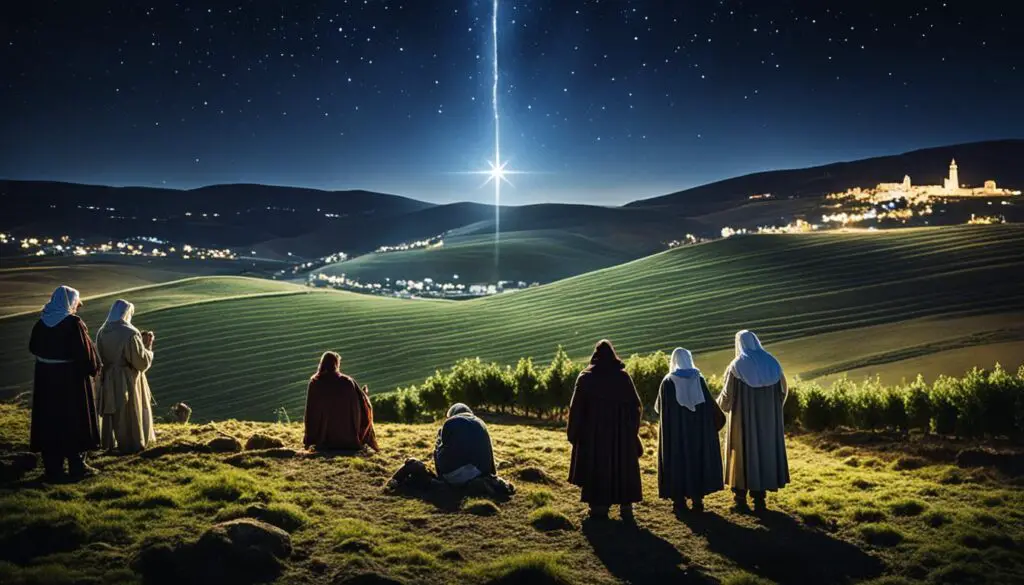
| Key Biblical Events in Bethlehem |
|---|
| The birth of Jesus in Bethlehem’s manger |
| The story of Ruth and Boaz, ancestors of King David |
| The journey of the Magi to worship the newborn king |
Cultural and Religious Practices in Bethlehem.
Bethlehem is a city that embraces a diverse range of cultural and religious practices, making it a fascinating destination for visitors from around the world. With a predominantly Muslim population, Islamic holidays are widely celebrated, showcasing the city’s Islamic heritage. At the same time, Bethlehem’s Christian minority keeps alive various religious traditions, especially during the Christmas season, which holds immense significance for the city.
One of the most prominent cultural events in Bethlehem is the annual Christmas celebration, attracting pilgrims and tourists from far and wide. The city comes alive with vibrant decorations, illuminating the streets with the joyous spirit of the season. The Church of the Nativity, a UNESCO World Heritage Site, becomes the focal point of these celebrations. It is believed to be the birthplace of Jesus and holds deep religious and historical importance.
“Bethlehem’s Christmas celebrations are a testament to the city’s reverence for this sacred occasion. The spirit of Christmas permeates every corner, creating an enchanting atmosphere of joy, worship, and unity.”
The Christmas traditions in Bethlehem are deeply rooted in the Christian faith. The Midnight Mass at the Church of the Nativity on Christmas Eve is a momentous event, drawing worshippers and believers from various denominations. The local Christian community actively participates in the mass, singing hymns and offering prayers, creating a powerful and spiritual experience for all in attendance.
Another notable tradition is the annual procession of the Patriarch from Jerusalem to Bethlehem. Led by the Greek Orthodox Patriarch, this event marks the beginning of the Christmas celebrations in the city. The procession is accompanied by a vibrant display of cultural performances, adding an element of festivity to the religious observances.
Santa Claus in Bethlehem
The presence of Santa Claus in Bethlehem is another unique aspect of the city’s Christmas traditions. Children eagerly anticipate the arrival of Santa Claus, who distributes gifts and spreads joy in the communities. This amalgamation of Christian and secular traditions adds to the diversity of the celebrations in Bethlehem.
It is important to note that while Bethlehem has a predominantly Muslim population, the city embraces its Christian heritage and fosters an environment of religious coexistence and cultural appreciation. The unity and harmony displayed during the Christmas season exemplify the city’s commitment to religious tolerance and diversity.
| Key Highlights of Bethlehem’s Cultural and Religious Practices |
|---|
| Annual Christmas celebrations attract pilgrims and tourists |
| Church of the Nativity as the focal point of Christmas traditions |
| Midnight Mass at the Church of the Nativity on Christmas Eve |
| Patriarchal procession from Jerusalem to Bethlehem |
| Incorporation of Santa Claus in Bethlehem’s Christmas traditions |
Bethlehem’s cultural practices and religious traditions create a unique atmosphere that captivates both locals and visitors alike. The city’s commitment to preserving and celebrating its heritage reflects an enduring spirit of community, tolerance, and reverence for the sacred. Whether you visit during Christmas or any other time of the year, Bethlehem’s cultural and religious richness will leave a lasting impression.
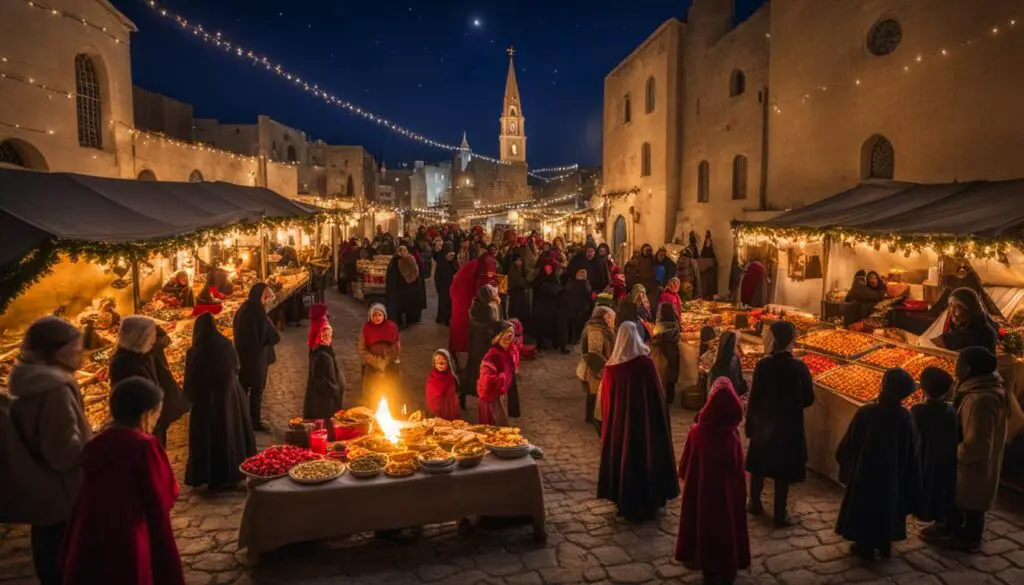
Prophetic and Eschatological Significance of Bethlehem.
Bethlehem holds a significant place in biblical prophecies and the eschatological narrative. The prophecies anticipate the birth of the Messiah in Bethlehem, emphasizing the city’s role in God’s redemptive plan for humanity. These prophecies not only highlight the historical importance of Bethlehem but also point towards its future significance in the end times.

The Old Testament book of Micah, specifically Micah 5:2, predicts that the Messiah will be born in Bethlehem, saying, “But you, Bethlehem Ephrathah, though you are small among the clans of Judah, out of you will come for me one who will be ruler over Israel.” This prophecy was fulfilled when Jesus, the awaited Messiah, was born in Bethlehem.
Furthermore, the prophecies related to the end times also mention Bethlehem. According to some interpretations, Bethlehem will play a significant role in the events leading up to the second coming of Christ. It is believed that the return of Jesus will involve Bethlehem in some eschatological capacity, although the precise details are not explicitly outlined in biblical texts.
“But you, Bethlehem Ephrathah, though you are small among the clans of Judah, out of you will come for me one who will be ruler over Israel.” – Micah 5:2
While the exact eschatological role of Bethlehem remains a topic of interpretation and speculation, its prophetic significance underscores the enduring importance of this ancient city in God’s ultimate plan for humanity’s salvation and redemption. The prophecies regarding Bethlehem serve as a reminder of God’s faithfulness and the fulfillment of His promises throughout history.
Current State of Bethlehem.
Today, Bethlehem stands as a city deeply rooted in history and culture. With its close proximity to Jerusalem, Bethlehem attracts visitors from around the world, especially during the Christmas season. However, the current state of Bethlehem presents some unique challenges for its residents and the Christian population in particular.
Bethlehem today is predominantly Muslim, with a significant Christian minority. The Christian community, although smaller in number, plays a vital role in preserving the city’s religious heritage and maintaining its status as a sacred destination for Christians worldwide.
Living in Bethlehem as a Christian comes with its own set of difficulties. Discrimination and limited religious freedom have posed challenges for the community, making it increasingly challenging to practice their faith freely.
The city’s economy heavily relies on tourism, particularly during the Christmas season. Pilgrims and tourists flock to Bethlehem to experience the joyous celebrations surrounding the birth of Jesus. This influx of visitors brings economic opportunities for the local community and serves as a reminder of the city’s biblical significance.
Demographics of Bethlehem:
| Religious Population | Percentage of Population |
|---|---|
| Muslim | Approximately 70% |
| Christian | Approximately 30% |
Key Challenges Faced by Bethlehem’s Christian Population:
- Limited religious freedom
- Discrimination and marginalization
- Social and economic pressures
Despite these challenges, the Christian community in Bethlehem remains resilient, preserving their faith and striving for unity and coexistence with their Muslim neighbors. Organizations and initiatives are working to support Christians in Bethlehem and promote interfaith dialogue and understanding.
“Bethlehem may be facing difficulties, but our hope lies in the enduring faith of its people and the promise of a brighter future where all communities can live together in peace and harmony.”
Bethlehem’s vibrant history and religious significance continue to attract visitors from across the globe. As this ancient city looks towards the future, the hope for prosperity and reconciliation remains, as the spirit of Bethlehem lives on in the hearts of its people.
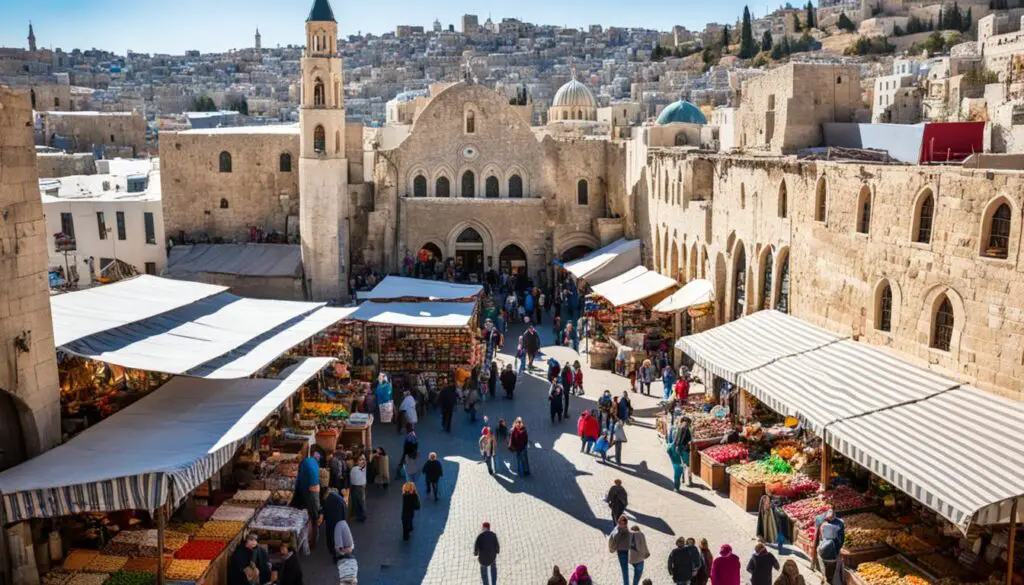
Organizations Supporting Bethlehem.
Despite the challenges faced by Bethlehem’s Christian population, there are organizations working tirelessly to support the local community and create positive change. Two notable organizations making a significant impact in Bethlehem are The Bethlehem Project and Blessing Bethlehem.
The Bethlehem Project
The Bethlehem Project is dedicated to the development of small businesses and the provision of leadership training for Christians in Bethlehem. Recognizing the importance of economic empowerment and self-sustainability, this organization offers resources, mentorship, and financial support to budding entrepreneurs in the community.
Through their programs, The Bethlehem Project aims to create job opportunities and empower individuals to be catalysts for change within Bethlehem. By nurturing and equipping local talent, they believe in building a stronger and more prosperous future for the residents of Bethlehem.
Blessing Bethlehem
Blessing Bethlehem is a collaborative effort between Orthodox Jews, Arab Christians, and Western Christians with a common goal of serving the poor and needy in Bethlehem and surrounding regions. This unique initiative transcends religious and cultural barriers to address the pressing needs of the community.
Blessing Bethlehem operates various projects, including food distribution, medical aid, education programs, and economic empowerment initiatives. Through their holistic approach, they strive to meet physical, emotional, and spiritual needs, offering hope and support to those struggling in Bethlehem.
| Organization | Focus Area | Impact |
|---|---|---|
| The Bethlehem Project | Small business development and leadership training | Creating job opportunities and empowering the local community |
| Blessing Bethlehem | Serving the poor and needy | Providing essential aid, education, and economic empowerment |
Hope and Reconciliation in Bethlehem.
Despite the challenges faced by the residents of Bethlehem, there is a glimmer of hope for reconciliation and unity among different religious and ethnic groups. One of the driving forces behind this hope is the unwavering faith of the evangelical churches in Bethlehem. These churches continue to believe in the restoration of their beloved hometown and actively work towards fostering peace and understanding.
One of the remarkable aspects of this hope is the coming together of Jews and Arabs in worship, as prophesied in the Bible. This vision of unity transcends religious and cultural barriers, paving the way for reconciliation. Arab Christians in Bethlehem play a crucial role in this process, wielding their faith as a powerful tool for healing and bridge-building.
“In Bethlehem, we yearn for the day when peace will reign and people of different backgrounds will coexist harmoniously. We believe that reconciliation is not only possible but necessary for the thriving of our community,” says Reverend David Nasser, a prominent figure in the Bethlehem evangelical community.
The Arab Christians in Bethlehem embody the spirit of hope and reconciliation, serving as catalysts for positive change within their community. Through their commitment to peace and understanding, they inspire others to seek common ground and build bridges of mutual respect.
In the journey towards reconciliation, Bethlehem stands as a symbol of resilience and determination. Despite the complexities of the region, the people of Bethlehem cling to the hope that one day, their homeland will be a place of unity, understanding, and shared prosperity.
Initiatives Promoting Reconciliation
Several initiatives in Bethlehem are actively working towards promoting reconciliation and fostering a culture of peace. These initiatives aim to bridge divides, build relationships, and create opportunities for dialogue and understanding.
- The Bethlehem Bible College Peace Studies Program offers courses and training in conflict resolution, peacebuilding, and interfaith dialogue.
- Organizations like the Holy Land Trust and Wi’am Palestinian Conflict Transformation Center provide forums for dialogue and reconciliation between Palestinians and Israelis.
- The Christian Peacemaker Teams (CPT) have a presence in Bethlehem and work alongside local communities to promote nonviolent solutions to conflicts.
Through these initiatives and the indomitable spirit of its people, Bethlehem continues to be a beacon of hope for a future characterized by reconciliation, understanding, and unity.
Conclusion.
Bethlehem holds a special place in the hearts of believers worldwide due to its biblical significance, historical connections, and vibrant religious practices. As the birthplace of Jesus, Bethlehem fulfills ancient prophecies and encompasses profound theological themes. The city’s rich history, from being the burial place of Rachel to the hometown of King David, further emphasizes its importance in the Bible.
Despite the challenges it faces, Bethlehem offers hope for a future of unity and reconciliation among its diverse communities. Organizations like The Bethlehem Project and Blessing Bethlehem are actively working to support and uplift the local community amidst difficulties. Additionally, evangelical churches in Bethlehem continue to hold onto their faith, fostering a sense of hope and restoration for the city.
As visitors journey to Bethlehem, they not only encounter the physical site of Jesus’ birth but also experience the cultural and religious practices that shape the city’s identity. The annual Christmas celebrations in Bethlehem attract pilgrims and tourists from all over the world, showcasing the city’s global significance as a pilgrimage destination
Overall, Bethlehem remains an iconic location that invites believers to delve deeper into the biblical narrative and contemplate the profound theological truths it represents. The enduring legacy of Bethlehem serves as a reminder of the timeless hope, redemption, and unity found in the Scriptures.
FAQ
What is the biblical significance of Bethlehem?
Bethlehem holds profound biblical significance and theological importance as the birthplace of Jesus and the setting for key biblical events.
What is the historical significance of Bethlehem?
Bethlehem is associated with significant historical figures, including King David, and is mentioned as the burial site of Rachel in the book of Genesis.
Where is Bethlehem located?
Bethlehem is located approximately six miles south of Jerusalem in the modern-day West Bank region. It is situated in the hills of Judah and is visible from the Mount of Olives.
Are there any archaeological discoveries in Bethlehem?
Yes, archaeological excavations in Bethlehem, particularly in the City of David, have revealed the existence of the ancient city mentioned in the Bible.
What are the theological themes associated with Bethlehem?
Bethlehem is associated with themes of sacrifice, redemption, and kingship in the biblical narrative.
What are some key biblical events that took place in Bethlehem?
Bethlehem is the birthplace of Jesus and is significant in the stories of Ruth and Boaz, as well as in the journey of the Magi who came to worship the newborn king.
What cultural and religious practices are observed in Bethlehem?
Bethlehem has a unique blend of cultural and religious practices, with predominantly Muslim and a significant Christian minority population. The city celebrates Islamic holidays and holds traditions surrounding Christmas.
What is the prophetic and eschatological significance of Bethlehem?
Prophetic biblical texts foretold the birth of the Messiah in Bethlehem, highlighting the city’s role in God’s redemptive plan. Some interpretations suggest Bethlehem will play a significant role in the end times.
What is the current state of Bethlehem?
Present-day Bethlehem is predominantly Muslim, with a significant Christian minority. The Christian population faces challenges and decline, and the city’s economy relies heavily on tourism.
Are there any organizations supporting Bethlehem?
Yes, organizations such as The Bethlehem Project and Blessing Bethlehem are actively supporting the local community through small business development, leadership training, and assistance to the poor and needy.
Is there hope for reconciliation and unity in Bethlehem?
Despite the challenges faced by Bethlehem’s residents, evangelical churches continue to hold onto their faith and believe in the restoration of their hometown, highlighting the promise of peace and the coming together of different communities in worship.
What is the concluding thought on Bethlehem?
Bethlehem’s biblical significance, historical connections, and religious practices make it a place of profound importance in the Bible. Despite the challenges, there is hope for a future of unity and reconciliation among different religious and ethnic groups.
